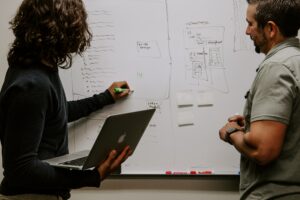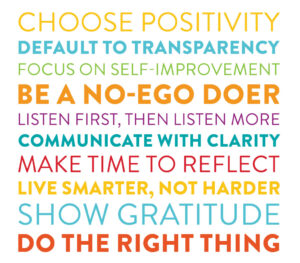Traditional office jobs are starting to lose their appeal with the rise in remote work. Still, the biggest hurdle for those looking to work remotely is to even land a remote job interview. There’s no definite answer on how to set yourself apart. With the competition being tougher than ever, even getting your foot in the door can be a real challenge.
The first step is to present an application that will land you the interview. Companies like Zapier invite only 2% of applicants for an interview and only hire 0.4% of all applicants. Rest assured, they aren’t the only ones.
However, your first impression is the one key aspect for an employer to even consider you as a potential candidate for the role. So if you don’t match the basic requirements, you’ll be standing by the door forever. But how can you present your already attained skills in a way that the employer would like to reach back out to you?
Why the Résumé is Important
Since landing a remote job is becoming increasingly difficult, a stellar resumé, or LinkedIn profile, has the potential to set you apart. We spoke with John Davidsson, founder of Olympic Résumé and an acclaimed career coach, to gain insight on how to showcase yourself as the best match for the job and a ‘remote ready’ candidate.
John says,
“Over the years, many Fortune Global 500s have announced the prestige associated with landing an interview…much less the job.In my experience companies like Amazon and Zillow compare themselves to top-tier universities like Harvard and Stanford when it comes to landing interviews.”
Prove your Hard Skills with Examples

A résumé should clearly showcase your skills. So making sure they are clearly highlighted for the employer to recognize is vital, especially when they’re using an automated system to scan CVs. More often than not, what lacks in applicants’ résumés is their ability to clearly state that they have the skills needed for the job.
John says,
“It’s still pretty rare that I see a new client who has been systematically building a customized résumé that legitimately “proves” their ability to do the job on day one. I would say superior written AND verbal communication skills are necessary for remote roles along with collaboration. You could simply state “excellent written communication skills” on your résumé, or you could describe your ability to build great PowerPoint decks or deliver presentations. Or manage projects and collaborate with diverse, remote global teams.”
This is actually a common mistake: not giving examples of the skills you’ve listed on your résumé. By giving an example of how you’ve implemented said skills it can help the employer visualize you working for the company. Almost every résumé just lists the key traits that the candidate brings to the table. However, chosen candidates are the ones that have gone in depth to explain how they use those skills in real life scenarios. Keep in mind, inadvertently you also show your communication skills in every written communication with the company. So make sure anything in writing is crisp, to the point and typo-free.
Highlight your Soft Skills

Not only is it necessary to present your core competencies regarding hard skills. Soft skills are just as important as these show the employer your capability to work within a distributed team.
Fareen, our Director of Talents says,
“You can highlight your soft skills, like communication and collaboration, or being a team player, by explaining how you’ve achieved your goals across various projects as a team. Showcasing how you’ve successfully communicated with team members through various tools and asynchronous channels can also indicate your communication skills in a remote set up. In addition, I strongly believe, a well-articulated résumé itself speaks volumes of one’s communication skills.”
Generally speaking, “stellar communication skills” seem to be on almost every job description out there, especially for remote roles. This is due to the fact that as a remote worker, communication is the key element in collaborating and working with your team. Therefore, it’s important to prove your knowledge of current communication tools. Having experience with applications such as Slack, Zoom, SharePoint and OneDrive can show your competence working with a remote team.
Other key soft skills such as collaboration and being a team player go hand in hand with your ability to communicate, so describe previous successes where these skills were necessary. When presenting soft skills, it’s important to provide examples and context to give your future employer the opportunity to imagine you as part of their team. Applying for a remote role means the interview process will most likely be fully remote as well. This means it’s crucial to use every touchpoint with the employer to showcase and back up the soft skills you’ve stated on your resume.
Showcase your Remote Readiness

Let’s say you have absolutely no remote work experience but want to land your first remote job. You need to convince the recruiter that you’ll be able to handle the challenges that come with working remotely. In general, hiring managers want to mitigate risk when hiring a new employee. For remote roles, that includes your aptitude to excel in this working environment.
John says,
“Have I ever worked 100% remotely? No, I have not. But if I was interviewing for a remote job, I would highlight that I have worked at Canon, for example, with individuals spread all over the United States.”
This a great example of showcasing existing experience to highlight concrete remote working skills. Many candidates without remote experience are likely to have worked in an international working environment. Have you worked with peers and colleagues from different countries in different timezones? Then try to leverage this experience to highlight your flexibility. Especially when you have no full-time remote experience, this type of “informal” remote experience is extremely important. Whether you’re working from home three days a week or work with a global team, this can indicate your aptitude and experience required for working remotely.
Being remote ready is crucial in beating your competition. It may not be an easy task, especially if you’re looking to land your first remote job as one of the thousands of applicants around the world. However, we’ve created a remote ready essentials guide to get you headed in the right direction. As mentioned in the guide, and experienced remote workers definitely agree, it’s quite important to be tech savvy. Having experience with the latest productivity and communication tools can equal to a higher chance of success. So it’s important to state them on your résumé. Some great examples we have in our guide are G Suite, Slack, Zoom or Skype, and Trello or Jira.
Research the Company Culture
Many remote-first companies include culture or value related questions in several interviews during the application process. Others prefer to conduct one interview specifically to see whether you would be a good culture fit. Normally this interview is with a higher-level person at the company, such as a COO or even CEO. It could also be someone outside of the team you would be working with. To get an idea of the hiring process of a fully remote company, you can check out Doist’s application process here. Notice, that most companies rely on remote job interviews only, and don’t require you to interview in person.
In Doist’s case, culture already plays an important role in their initial screening, specifically when recruiters look at the required cover letters. But how do you convey that you’re a good culture fit in those early stages? This can be especially challenging when you’re applying at companies that don’t even require a cover letter. This seems to be the reality at most companies nowadays.
The first step is to research the company and understand what makes its culture unique. Each company has its own culture and values, so it’s a good idea to find out what they are. For example, Buffer’s 10 company values are

Determine Your Value Alignment with the Company
It would also be a good idea to look at some employees of the company, and how they live by those values. For example, you could read Marcus’ Guide to Active Listening. Then, the second step is to make sure you showcase your own values and personality on your resumé and in every communication with the company.
For example, Buffer’s ‘Focus on Self-Improvement’ could be a great value to highlight on your resumé if this is something you have proven to do. Personally, I take online courses in my spare time to improve my Facebook Ads skills, which I can now easily showcase on my CV.
At acework, we require candidates to submit a writing sample about why they would like to work remotely. This is a stellar opportunity to shine in terms of your written communication skills. It should also reflect you as a person and highlight what’s important to you. In addition, companies on acework usually ask between 2 and 4 unique questions for each posted role. Candidates are required to answer those either written or in video format.
Generally, it is important to understand that culture fit goes both ways. You should consider if the company is a good fit for you as much as they evaluate if you are a good fit for them. Therefore, showing your personality and being authentic is more important than telling the company what you believe they want to hear. Honesty is a key attribute a recruiter looks for in an ideal candidate. If you’re lacking experience in an area, it would be advantageous to say you’re eager to learn that skill. Also give a specific reason why you’ve applied to the company, for example to work on specific projects to hone your skills – and when you land the remote job interview, don’t forget to ask culture related questions!
Clean up your Social Media Act

1. Treat your LinkedIn presence like a highlight reel
Living in an ever-growing digital era, social media has become increasingly important when applying for jobs. It’s no news that remote and non-remote employers alike perform searches on social media and Google to find out more about applicants. Especially for remote roles, where a large portion of the job will be online, a strong online presence seems even more crucial.
John says,
“If I search for you on LinkedIn, and I can’t find you or you haven’t put much effort into your profile, I could see this as a serious red flag. I even tell clients who may be all about social media that just your LinkedIn presence could make or break your career search. When you send your CV as a pdf, it should have a direct link to your LinkedIn profile to immediately demonstrate your online presence. You should stick to a professional photo and you should have a good number of connections and links to your industry. You should also have some good recommendations.”
2. But don’t forget about Instagram, Twitter and Facebook
However, other social media has gained importance in a professional capacity as well. More and more people use their own Instagram for personal branding, not just influencers. Of course it’s not unusual that an employer decides to search for you online before inviting you to a remote job interview. For this situation, it’s a good idea to use your social media professionally and keep your accounts up to date. Any old or un-professional accounts should be deleted or put on private.
John says,
“For certain roles, it might be strange if you don’t have an Instagram account. Let’s say I’m looking for a good marketer. I search for you on Instagram and I can’t find you or your account seems unprofessional. That’s not a good sign.”
Therefore, growing a personal brand is not only important for solo-preneurs. It can also be useful for professionals applying for roles at brand-intensive companies or marketing positions.
“Your brand is what other people say about you when you’re not in the room.” – Jeff Bezos
The same can go for writers or journalists on Twitter, for example. For them, Twitter can be an important medium to showcase their relevance and expertise. It’s a good idea to post any relevant articles in your field on Twitter regularly. The same could then be posted on a public Facebook page too. If you’re asked to manage a Facebook page then it’s also a good idea to keep your own Facebook neat and tidy.
Seek Advice from A Career Coach
As a previous hiring manager for Canon, John has experience hiring for a Global Fortune 500. For people that haven’t worked in fully remote roles, he recommends highlighting your willingness and ability to evolve into the role thanks to similar previous experience. His main focuses would be the ability to communicate, write effectively and ability to collaborate. We agree, presenting universal skills that can be applied to any industry is important. This means when you provide examples it’s best to tailor them to a remote role.
Our Director of Talent, Fareen, also says that it’s important to showcase your skills in the right manner. For a candidate to know if they are ready for remote work opportunities, they should try working from home if their current organisation allows it. If not, it’s a good idea to work out of cafés or a co-working space on the weekend. This lets you determine your comfort level with working in these environments.
Get a remote job interview with the acework Process

At acework, we want to make it easier for candidates to get invited to a hard-to-get remote job interview. In order to prepare candidates, we have designed a thorough ‘Remote Ready’ vetting process. Firstly, acework applicants fill out our sign-up form, which should only take around 10 minutes. Secondly, to verify your remote readiness, we schedule a short video call with you and an expert member of our team. Lastly, you will need to provide us with two professional references. We will send them a questionnaire about your past performance and personality. Once you are successfully on-boarded, we’ll provide you with a ‘Remote Ready’ certificate. You can use it when you apply for any remote position or directly on acework.
We know how hard it is to even get your application in front of the eyes of an attentive recruiter. Therefore, we developed a matching system, which directly connects candidates with recruiters at our partner companies. In order to get matched, candidates must have a complete profile on the acework platform and receive at least one positive reference. They also must have passed our ‘Remote Ready’ assessment. From there, chances of landing a remote job interview is about 60%!
Finally, use your acework profile to show who you are
On one hand, our matching algorithm focuses on hard skills and requirements needed for each position. We also allow candidates to showcase their personality, values and potential culture fit in various ways. One example: candidates can easily add the results of the free 16personalities online test. Acework profiles also include candidate preferences, such as the time of day you’re most productive. In addition, we ask which time zone you prefer to work in and how much remote experience you have. The answers to the specific set of questions gives recruiters a solid first impression of the candidate.
Got the interview? That’s brilliant! Read how to ace a remote job interview here.
At acework we are warriors for greater flexibility and happiness at work. We are here to help you find your remote dream job. Get Remote Ready with us here, sign up and get matched with opportunities. You’ll be able to prove yourself during your first remote job interview in no time. If you have any questions, comments or ideas get in touch directly (talent@acework.io).






